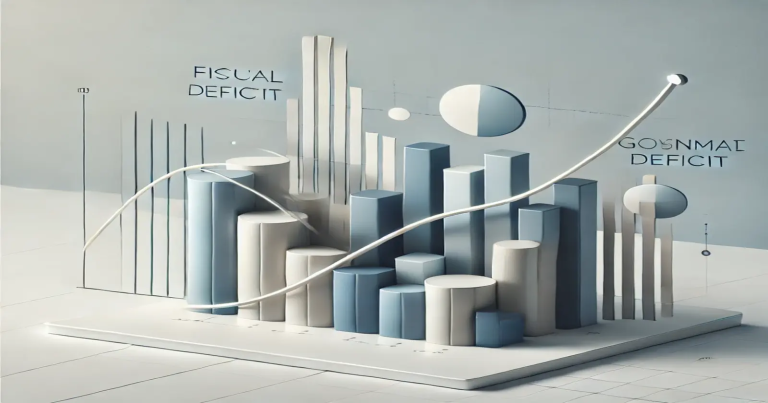A fiscal deficit arises when the total expenditure by any government exceeds its revenue, excluding borrowings, for a particular fiscal period. It represents the difference between what the government spends and what it collects in the form of taxes, duties, and other revenues during that fiscal period. It allows knowing how much a country needs to borrow to fund its own activities.
What is Fiscal Deficit?
Fiscal deficit is the amount of income a government fails to collect in terms of its spending. That is, a government is spending more than it earns, excluding loans and borrowings. Fiscal deficits are something that occurs regularly. If kept within limits, they form an engine for growth through financing infrastructure and social welfare programs. In the long term, fiscal deficits eventually increase debt accumulation and economic instability.
Formula for Fiscal Deficit:
| Fiscal Deficit = Total Expenditure−(Total Revenue+Non-debt Capital Receipts) |
Where:
- Total expenditure includes all the government’s expenses (revenue expenditure + capital expenditure).
- Total revenue refers to the total income from taxes and other sources, excluding borrowings.
- Non-debt capital receipts include all capital receipts, such as the sale of government assets, excluding any borrowings.
For example, if a government’s expenditure is ₹10 trillion and revenue (excluding borrowings) is ₹8 trillion, the fiscal deficit would be ₹2 trillion. This gap must be financed through borrowing or other mechanisms.
Why is it Important to Worry About Fiscal Deficit?
The fiscal deficit stands out as an important constituent of the overall well-being of any economy. Though a reasonable deficit may, due to its support of growth by funding public investments, facilitate growth, an unchecked or growing deficit could badly affect an economy.
- Debt: Among the largest deficits can result in higher government debt over time. Servicing this indebtedness takes more government resources, which means that there is less money to spend on important social services such as education and health.
- Inflation: High fiscal deficits can cause inflation. When the government borrows to finance its deficit, it can inject an overwhelming amount of money into circulation, which tends to erode the currency’s purchasing power.
- Interest Rates: More borrowing can push up interest rates, as the government competes with the private sector for funds, making it more expensive for businesses to borrow and invest.
- Crowding Out Effect: Excessive government borrowing can limit the funds available for private sector investments, hampering economic growth.
Impact of Fiscal Deficit on Economy
Fiscal deficit plays a crucial role in determining the financial health of a country. It reflects the gap between the government’s total expenditure and its total revenue (excluding borrowings). A fiscal deficit means the government is spending more than it earns, and to bridge this gap, it borrows money either from internal or external sources. While a moderate fiscal deficit can boost growth if used wisely, a high and rising fiscal deficit can create serious problems for the economy in the long run.
1. Inflationary Pressures
- Government Borrowing: A high fiscal deficit typically requires the government to borrow more to meet its expenditure needs. This increases the money supply in the economy, which can lead to inflation. If the government prints more money to finance its deficit, it can cause demand-pull inflation, where an increase in demand outstrips the economy’s capacity to produce goods and services.
- Higher Prices: As inflation rises, the prices of goods and services increase, eroding the purchasing power of the currency. This affects consumers and can lead to a reduction in overall demand for goods and services.
2. Interest Rates
- Crowding Out Effect: When government tends to borrow and issue government bonds. This may cause interest rates to climb as the government and private companies bid against one another for the same scarce capital.
- Cost of Borrowing: Charging businesses and consumers more to borrow can be a drag on the economy, and higher interest rates can make that loan costlier. This can depress investment and consumption, which can slow economic growth.
3. Currency Depreciation
- Impact on Exchange Rates: A huge fiscal deficit may lead to questions on the financial stability of a country and thereby lead to a fall in that country’s currency. Investors can also tend to sell off the currency if they’re concerned the government will be unable to pay its debts.
- Foreign Exchange Reserves: A sharp depreciation of a currency in any given country could make the imports more expensive and lead to higher inflation. A more feeble currency can also erode foreign exchange reserves, leaving the government less able to pay off external debts.
4. Government Debt and Sovereign Rating
- Increasing Debt Burden: Increasing fiscal deficit leads to the rising government debt. When debt is accumulating, future citizens will shoulder this burden by servicing this debt, thus undermining the ability of the government to allocate and finance national priorities (e.g., infrastructure, education, and health care).
- Credit Ratings: It is noted that high deficits could lead to a country’s sovereign credit rating taking a negative hit. The credit downgrades from rating agencies like Moody’s, S&P, and Fitch could raise a country’s borrowing costs in the future.
5. Long-Term Economic Growth
- Structural Imbalances: Chronic fiscal deficits can indicate underlying structural weaknesses in the economy when the government is unable to sustain itself in terms of its spending and revenue-earning capacity. Eventually, this could result in a fiscally unsustainable position, lower investor confidence, and slower economic growth.
- Fiscal Consolidation: Indeed, if the government is unwilling or unable to consolidate the fiscal side then it may find its ability to attract inward investment (local or foreign) constrained more than it would like, or growth might be capsized
Impact of Fiscal Deficit on Investors
Fiscal deficit affects not just the government or economy—it also plays a crucial role in shaping investor behavior, sentiment, and returns. Investors, whether they are retail participants, mutual fund houses, institutional investors, or foreign investors, closely watch a country’s fiscal deficit figures. A rising fiscal deficit signals economic imbalance, which may increase risk in financial markets. On the other hand, if managed well, deficit spending can open investment opportunities and spur economic activity.
1. Investor Confidence
- Market Sentiment: A growing fiscal deficit may tell investors that the government isn’t able to get its finances under control, sparking worries over the country’s financial health. That, in turn, could erode investor faith in government bonds and other financial products.
- Portfolio Decisions: That means investors might sell some of their existing holdings and move them into safer investments, like gold, foreign currency, or bonds from nations with more stable finances—presaging economic instability. The result could be capital flight out of the country, destabilizing the economy some more.
2. Bond Yields and Government Debt
- Higher Yield Demands: With the government borrowing more to cover the deficit, it issues more debt in the form of bonds. The government may have to pay a higher yield to entice buyers for those bonds. Government bond yields could rise as a result, a sign of higher borrowing costs.
- Bond Market Volatility: When fiscal management is uncertain, bond prices can also become uncertain, sometimes even quite volatile. And if investors begin to notice that the government could default on its debt, or they could ask for higher returns, which in turn spikes the costs of borrowing for the government.
3. Stock Market Performance
- Investor Risk Perception: An increasing fiscal deficit would put pressure on the country’s financial system. Market and other economic risks, such as the effects of higher interest rates in particular segments of the market or inflation, could also have a negative impact on the market.
- Sectoral Impacts: Some sectors, like financials or consumer goods, are more rate- and inflation-sensitive. Investors might pivot away from those sectors if they anticipate an environment of higher borrowing costs and weaker consumer demand as a result of inflation.
4. Foreign Investment
- Attractiveness to Foreign Investors: High fiscal deficits can deter foreign investment, especially foreign direct investment (FDI). Foreign investors seek stable economic environments, and a rising fiscal deficit can be a sign of instability or poor economic management.
- Exchange Rate Risk: Investors in foreign assets may also be concerned about currency depreciation as a result of a high fiscal deficit. Exchange rate fluctuations can erode the value of returns for foreign investors, making the country less attractive for investment.
5. Inflation and Asset Prices
- Rising Inflation: As discussed earlier, a fiscal deficit can lead to inflationary pressures. Investors in real assets like property or commodities might benefit from inflation, as asset prices tend to rise during inflationary periods.
- Precious Metals and Commodities: Some investors may turn to precious metals like gold or commodities as a hedge against inflation and currency devaluation. These assets are often seen as safe havens during times of fiscal uncertainty.
How Does the Government Fund Its Fiscal Deficit?
When a government runs a fiscal deficit, it must borrow money or generate additional revenue to cover the shortfall. There are various ways in which governments fund their deficits:
Domestic Borrowing
The government borrows from the domestic source through bonds and securities, normally acquired by banks and financial institutions and the public. This method gives immediate funds for bridging the deficit but increases future liabilities because of payments of interest.
External Borrowing
Governments borrow from international sources such as foreign governments, international organizations such as the IMF or World Bank, and foreign bond markets. External borrowing earns currency, but this comes with the threat of currency risk and economic risk.
Monetary Financing
Sometimes, the central bank finances the fiscal deficit by printing more money. It’s an easy solution but usually portrays all its negative effects, such as inflation and depreciation of the local currency, thereby making it risky.
Disinvestment
The government can disinvest its stakes in public sector companies to raise money. This decontrols the government from such companies but also provides much-needed capital without increasing its level of debt.
Each funding method has its implications for inflation, interest rates, and economic growth, and governments often use a combination of these methods to balance risks and benefits.
Causes of Fiscal Deficits
Fiscal imbalances can be attributed to several dominant issues, such as an overexpanded budget on social security programs or infrastructure projects in addition to military defense without a commensurate hike in revenues. During economic downturns, tax collections may decline due to business downfalls, and thus a deficit may ensue. Tax cuts or incentives not accompanied by growth in the economy may also reduce government revenues. This finally reaches a point where increased interest payments on outstanding debt overwhelm budgets, compelling governments into further borrowing and keeping the cycle of fiscal deficits.
Understanding the causes of fiscal deficits is crucial for developing strategies to manage them effectively and maintain economic stability.
- High Government Spending: Public expenditure on infrastructure, defense, social welfare programs and subsidies can increase government budgets and fiscal deficits.
- Low Tax Revenue: Inadequacies in tax collection, illicit tax evasion or tax cuts in times of business downturn shrink the government’s revenues, thereby enlarging the fiscal deficit, suggesting that joint tax evasion-reduction policies are expedient.
- Economic Recession: In hard economic times, tax revenue is down and welfare costs are up, worsening the deficit.
- Tax-Cuts and Social Programs: Subsidies are also given to lower prices on food, fuel and education. These programs, however, can be very expensive for the government.
- External Factors: During global emergencies such as the COVID-19 pandemic, trade can fall and spending on healthcare and economic support may rise, a dynamic that widens the fiscal deficit.
How Does the Government Balance the Fiscal Deficit?
A fiscal deficit is one of the challenges to long-term economic stability in a country, and governments use several strategies to do it properly. One such traditional approach is revenue collection through means like improving tax compliance, broadening the tax base, or raising indirect taxes. Ideally, governments may also reduce non-essential expenditures and make sure that money is spent on infrastructure, health, and education, which play important roles in enhancing economic growth and development. This can be achieved through borrowing, either locally or internationally. However, this has to be done in a prudent manner so as not to delve into unsustainable levels of debt.
Moreover, the interest rates are very often modified by governments through the monetary policy which has influences on the flow of economic activities and controls inflationary influences; thereby, indirectly, it also determines the fiscal deficit. Utilizing a combination of such techniques, governments endeavor so that a successful economy with growth and stability should not turn out to be a fiscally irresponsible body.
Strategies to Balance Fiscal Deficit
Governments must strike a balance between fiscal discipline and spending on development programs, ensuring that measures to reduce the fiscal deficit do not hamper economic growth.
- Tax Reforms: Increasing the efficiency of tax collection, widening the tax base, and tackling tax evasion can raise government revenue and assist in reducing fiscal deficits.
- Eliminating Discretionary Expenses: Governments could also update their budgets to “minimize unnecessary or non-priority spending” by reallocating resources to priority areas such as infrastructure or health care.
- Private Enterprise and Disinvestment: The government can do so by disinvesting government shareholding in public enterprises and recoup resources to bridge the gap of its deficit without increasing borrowings or reducing services of a welfare state.
- Economic Reforms: Structural reforms like ease of doing business, promoting private sector investment, and improvements in productivity increase growth and lead to higher revenue receipts.
- Monetary Measures: Central banks, in certain situations, may initiate policies such as rate cuts to encourage borrowing and investment to take place, which can lead to economic expansion and an increase in government receipts.
Fiscal Deficit FAQs
What is the fiscal deficit?
Fiscal deficit refers to the shortfall between the government’s total expenditure and its total revenue, excluding borrowings.
Why is it important to manage the fiscal deficit?
Managing the fiscal deficit is crucial for preventing debt accumulation, inflation, and increased borrowing costs, which can harm long-term economic stability.
How does the government fund its fiscal deficit?
The government funds its fiscal deficit through domestic and external borrowing, disinvestment, and in some cases, printing more money.
What causes fiscal deficits?
Fiscal deficits are caused by high government spending, low tax revenue, economic recessions, and subsidies.
How does the government reduce the fiscal deficit?
Governments reduce fiscal deficits through tax reforms, cutting non-essential spending, privatization, and implementing economic reforms.


